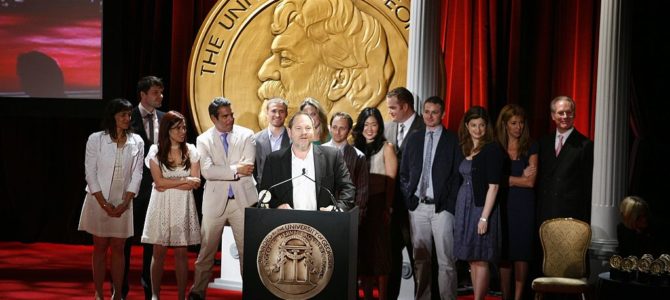
Breaking News: Hollywood is a den of iniquity. And in other stories, dog bites man.
I really hope the Harvey Weinstein scandal did not surprise you. For most of us, it merely confirms what we already suspected about the prevailing moral standards in the entertainment industry. Hollywood is hypocritical and morally corrupt? Well, of course it is. There is still a worthwhile lesson here, mind you, but it’s one we ought to have internalized a long time ago.
For those who remain blissfully unaware, until a few days ago, Weinstein was a powerful Hollywood producer, first with Miramax then with The Weinstein Company. He has since been exposed (an appropriate word considering the circumstances) for allegedly foisting his attentions on a long line of Hollywood starlets going back decades, up to and including various disgusting forms of sexual assault. You can read all the details, although I don’t recommend trying to do it on a full stomach.
But this isn’t just about Weinstein. The real scandal is that everybody knew what a creep Weinstein was and how he abused his power. He certainly looks the part, like a walking portrait of Dorian Gray with all his sins emblazoned across his puffy, sweaty, unshaven face. And nobody did anything about it. The employees and board members of his company covered for him, his lawyers paid off the accusers, actresses stayed silent because they were afraid it would affect their careers, and it is widely agreed that they were probably right: going public would have hurt them more than it hurt Weinstein. This is Bill Cosby all over again: a powerful man in show business dogged by accusations for decades, who never pays the price until the stories reach a critical mass and suddenly everybody flips against him.
I am tempted to say this is the result of a Hollywood culture in which mouthing “progressive” political views—Weinstein is a prominent supporter of the Left who initially tried to deflect trouble by promising to take on Donald Trump and the National Rifle Association—will get you off the hook for your mistreatment of actual human beings. I’m also tempted to say that this is what you get from the entertainment industry’s recent cult of the antihero, where protagonists of every movie and television show needs to be flawed and corrupted in some way, making them the perfect psychological projection of the producers behind them.
All of these may be contributing factors, but they’re not the main cause, because this sort of thing has been going on for much longer. Weinstein did not invent the “casting couch,” the first references to which apparently go back to 1937. It’s also not just Hollywood, nor just the Left. We’ve seen similar scandals involving religious institutions and, of course, politicians on both sides. The current president, as many will be eager to remind you, once stated the basic theory behind Weinstein’s life of infamy: “When you’re a star they let you do it. You can do anything.” It’s not just about sex, either. Some abuse their power for money, some for partisanship, and some just for the thrill of power itself.
What the Weinstein case reminds us is that our elites are corrupt. Not all of them, but a significant number. Because they are elites—because they have wealth, fame, influence, power—they can often get away with it. Not always and sometimes not forever, as Weinstein just found out. But they can get away with it repeatedly and on a large scale.
Such corruption can find a more or less permissive cultural environment, and Hollywood has always been on the more permissive side. But there is only one long-term solution that will mitigate the problem. I say “mitigate,” because you can never make everyone moral. But what you can do is to give them as little power as possible.
If the elites are corrupt (and we should always assume that they are), then we should give them as little political power as possible, subject to as many limits and checks and balances as possible. Every time we contemplate giving some new power to politicians or government officials, we should assume that we might be giving that power to the moral equivalent of Harvey Weinstein—and then we should think twice about it.
Beyond government, all of our cultural institutions should be designed to give as little power to unchecked personalities as possible. For those like Weinstein who are out in the private sector, we need to leave people as free as possible to speak and publish so they can criticize and expose the corrupt elites, which is the only thing that eventually stopped him. And we should leave the economy as free and vibrant as possible so that people have more ways to get around creeps who like to set themselves up as gatekeepers whose favor you have to curry if you want to get ahead.
Our elites are corrupt, and we shouldn’t be surprised. It is an old problem: power corrupts, and absolute power corrupts absolutely. There is also an old answer to that problem, a lesson we should all know already: that freedom is the enemy of power and the only escape from its corruption.
Follow Robert on Twitter.









